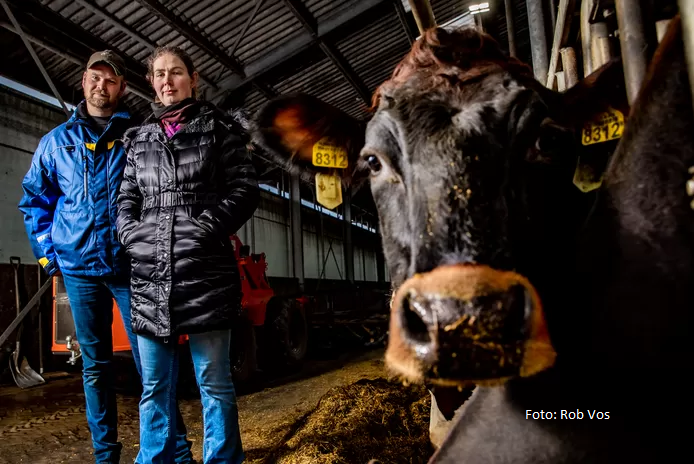Future in Slovakia for Dutch arable farmers
"We actually hoped to sow the first corn this week, but rain is forecasted for the upcoming weekend. We wouldn’t want to go into the fields with the sowing machine then. So, we tried to make a good start with spreading fertiliser. In the end, that became one load because the quality of the fertiliser wasn’t optimal, and we returned the batch. But today we managed to cover 70 hectares," says Thijs de Schutter, while sitting at a table behind his laptop with his brother Rick.
Their father, Frans de Schutter, is also at the table. Earlier in the week, he drove from Kloosterburen to Trakovice in western Slovakia, where the arable farm is located. He, along with his sons, owns the three limited companies but still lives in Kloosterburen. "I drive back and forth a lot, but during busy periods, I stay here for a continuous time to help. For example, with planting potatoes and sowing onions, beets, and corn. In the Netherlands, I'm basically just tending to the garden," he laughs. "My wife Carin still works in the Netherlands but often comes here too. My daughter Ilse studies in Dronten. We're still looking for the right rhythm."
Searching for quality land to grow potatoes
Rick and Thijs see a future in agriculture for themselves, preferably together. In Kloosterburen, the family had a 70-hectare arable farm. It was fine for the time, but too small for two incomes and had no growth opportunities. That's why they looked across the border five years ago. Initially, they focused on Denmark, where they searched for two years. "But we couldn't find a place where the land was suitable for high-quality potato cultivation," says Thijs. Through the website of emigration specialist Interfarms, the brothers discovered Slovakia. "Right next to Austria and with land prices that are one-tenth of those in the Netherlands." After exploring the Central European country, Rick and Thijs were convinced. The brothers could not find any bad land in Slovakia. "The soil is of such high quality," says Rick.
Potatoes, corn, wheat, onions, and sugar beets
The De Schutter family grows potatoes, corn for seed multiplication, silage and grain corn, durum and baking wheat, canola, onions, and sugar beets in Trakovice. However, potato cultivation is the main focus. The seed potatoes are partly sourced through contacts in the Netherlands. “We want to deliver good quality and differentiate ourselves with that. This includes fries and table potatoes. Sixty percent are fry potatoes that we supply to Lamb Weston in Austria or McCain in Poland. We use a portion of the consumption potatoes for packaging and selling in the region. Furthermore, another 10 percent is locally taken for flakes,” Thijs explains.
The Soil is rich in organic matter
The company cultivates crops on humic clay soil. One-third of the area consists of so-called Chernozem, very dark soil rich in organic matter. Another part is even darker, heavier clay soil. The majority is somewhat lighter, but it is all very rich in organic matter. "Most of the arable farms here are pure grain farms. We wanted something different to distinguish ourselves. There are only a handful of vegetable growers here. Moreover, we have always grown potatoes and onions."
Doubled
In July 2021, the arable farm in the Netherlands was sold. According to Frans, an exciting time followed. "We had seen some nice farms, but we didn't have any money in the bank yet. So, we first had to sell the farm in Kloosterburen to be able to act when necessary." Two months later, the farm in Trakovice came onto their radar. In June 2022, all the papers were signed, and the farm with an area of 1,200 hectares was officially transferred to the Dutch owners. "My brother and I actually worked here every other week with the previous owner since April 1 of last year."
Expanding storage opportunities
According to Frans, there is a great opportunity for the future of the business. "At the moment, we have some storage, but it's not high-tech enough for long-term preservation. There’s still a chance to serve the local market. There are only a few growers who cultivate vegetables, so a lot gets imported. Therefore, the potential to expand local sales is quite large." Thijs nods in agreement. "But there are also other challenges. The soil is fantastic, but the farm is run down. This is a typical Soviet-style farm with the office directly on the road. The other buildings are fine, but the mess left by the previous owner is still on the yard. Gradually, we need to decide what we want to do with that."
